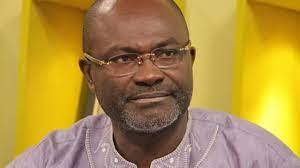Introduction:
Kennedy Agyapong, a well-known Ghanaian politician, recently made headlines with his controversial statement, asserting that "God must line up politicians in this country and lash all of us." His words, though provocative, have raised pertinent questions about the state of politics and governance in the nation. This article aims to explore the implications of Agyapong's call for divine accountability in politics and the need for ethical leadership to steer the nation towards progress.
The Context of Kennedy Agyapong's Statement:
Kennedy Agyapong, a member of parliament and a prominent figure in Ghana's political landscape, is known for his outspoken nature. His statement seems to reflect his frustration with the prevailing state of politics in the country. It's essential to understand the context of his remarks and the underlying issues that may have prompted such an impassioned outcry.
Politics and Corruption:
One of the primary concerns Agyapong's statement touches upon is the issue of corruption in politics. Corruption has long been a bane in many developing nations, and Ghana is no exception. Instances of embezzlement, bribery, and misuse of power by politicians have eroded public trust and hampered progress and development. Agyapong's call for divine intervention can be seen as a desperate plea to address this deep-rooted problem.
Ethics and Leadership:
Beyond corruption, the quality of leadership in politics is a crucial aspect that Agyapong's statement addresses. The actions of politicians shape the destiny of a nation, and ethical leadership is vital for sustainable development. Leaders who prioritise personal gains over the welfare of the citizens can cause immense harm to the country's social fabric and economic stability. By invoking divine punishment, Agyapong highlights the urgency for leaders to embrace moral responsibility and accountability in their roles.
The Role of Divine Accountability:
Agyapong's words allude to the notion of divine accountability, wherein individuals believe that a higher power will judge their actions and deeds. In societies with deep-rooted religious beliefs, invoking divine intervention can be a way to reinforce ethical behaviour. However, reliance on divine punishment alone is insufficient in addressing the complexities of political malfeasance. It must be complemented by practical measures and institutional reforms to hold politicians accountable for their actions.
The Need for Human Accountability and Reform:
While the idea of divine accountability may resonate with some, the tangible change can only be achieved through human accountability and systemic reforms. Ghana needs to strengthen its institutions, including independent anti-corruption bodies and impartial judiciary, to ensure that politicians face consequences for their misconduct. Transparent electoral processes, strict campaign financing regulations, and robust checks and balances can help foster a culture of accountability and integrity in politics.
Civic Engagement and Awareness:
Agyapong's statement also serves as a reminder of the importance of civic engagement and awareness. The citizens of Ghana play a critical role in shaping the nation's future. By actively participating in the democratic process, holding politicians accountable, and demanding transparency, citizens can create the impetus for positive change. Informed and engaged citizens are the backbone of a healthy democracy, acting as a counterbalance to unscrupulous politicians.
Educating the Next Generation of Leaders:
To break the cycle of corrupt politics, there is a pressing need to invest in the education and grooming of the next generation of leaders. Ethical leadership should be promoted from an early age, emphasising values such as integrity, empathy, and public service. By instilling these principles in future politicians, Ghana can build a cohort of leaders committed to the betterment of society rather than personal gain.
Conclusion:
Kennedy Agyapong's call for divine accountability in politics has sparked important discussions about the state of governance in Ghana. While his sentiments may reflect the frustration felt by many citizens, the solution lies not solely in divine intervention but in human accountability and systemic reforms. The fight against corruption and unethical practises requires the concerted efforts of citizens, political leaders, and institutions. By fostering a culture of integrity, transparency, and civic engagement, Ghana can pave the way for a brighter future, free from the shackles of corruption, and ensure sustainable progress for generations to come.




No comments yet
Be the first to share your thoughts!